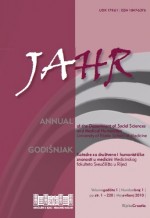Universal values contextualization and bioethics knowledge production in the age of genetics
Keywords:
biethics, feminist bioethics, critical bioethics, knowledge production, contextualisationAbstract
Th e impact of biotechnology on all living things is an interdisciplinary inquiry into some of humanity’s most fundamental questions: Who are we? How do we live together? How do we relate to the biosphere, to the rest of the living world? Are the answers given to these questions shaped by various contexts: social, cultural, economic, so on? Are there universal answers to these questions? Choosing this interdisciplinary fi eld of knowledge production as object of inquiry off ers an opportunity to investigate how traditional theories and disciplines are challenged to evolve in new directions as a response to techno-scientifi c developments of our times. It also allows us to study patterns of knowledge production, to examine hierarchies of knowledge and expertise, as well as the possibilities of interdisciplinary/transdisciplinary practices in a multicultural context. I will argue that a framework that incorporates universal principles shall constitute one di-mension of an adequate ethical theory in the context of new genetics providing that its princi-ples are formulated in non-exclusionary terms that refl ect the relational context of individual lives. As Judith Butler has formulated »the problem is not with the universality, as such, but with an operation of universality that fails to be responsive to cultural particularity and fails to undergo a reformulation of itself in response to social and cultural conditions it includes within the scope of its applicability. When a universal precept cannot, for social reasons be appropriated or when ...it must be refused, the universal precept itself becomes a site of contest, a theme and an object of democratic debate« (Butler, 2006, p. 6). What both feminist and critical bioethicists emphasize in connection with universalistic claims in bioethics is the necessity of refl ectivity upon such norms and concepts. Habermas also concludes that sociological reservations off er salutary corrections to normativism, but these critiques do not condemn normative theories to failure by social complexity. According to Habermas, purely normative considerations retain their relevance as long as we accept that complex societies shape themselves in a refl exive manner through law and politics (Habermas, 2008, p. 276) Th e selective readings of norms that have the grammatical form of universal statements but at the semantic level are vulnerable to particularistic interpretations of their basic concepts, such as persons, human being, call for an empirical explanation (Habermas, 2008, p. 285). Taken all these into account, and noting that the issues that are at stake in the ethical debates on the applications of various biotechnologies and genetics can deeply aff ect the ways we perceive us as humans, our relationships with others, and with the environment it would be more than desirable that in these debates a plurality of approaches to be represented, as this is stipulated in the three UNESCO Declarations on Bioethics.
Downloads
Published
Issue
Section
License
Authors who publish with this journal agree to the following terms:
- Authors retain copyright and grant the journal right of first publication with the work simultaneously licensed under a Creative Commons Attribution License that allows others to share the work with an acknowledgement of the work's authorship and initial publication in this journal.
- Authors are able to enter into separate, additional contractual arrangements for the non-exclusive distribution of the journal's published version of the work (e.g., post it to an institutional repository or publish it in a book), with an acknowledgement of its initial publication in this journal.
- Authors are permitted and encouraged to post their work online (e.g., in institutional repositories or on their website) prior to and during the submission process, as it can lead to productive exchanges, as well as earlier and greater citation of published work (See The Effect of Open Access).



